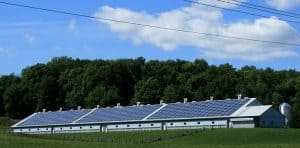Boulder Daily Camera
3 March 2013
Boulder can create a cleaner, more affordable, and more reliable power system. The analysis of Boulder’s energy options, released last Thursday, found that the formation of a city owned and operated utility would slash greenhouse gas emissions while matching Xcel’s energy rates. Importantly, by giving Boulder control over its electrical system, municipalization allows the city to drive a decentralized, clean energy transformation.
[fusion_builder_container hundred_percent=”yes” overflow=”visible”][fusion_builder_row][fusion_builder_column type=”1_1″ background_position=”left top” background_color=”” border_size=”” border_color=”” border_style=”solid” spacing=”yes” background_image=”” background_repeat=”no-repeat” padding=”” margin_top=”0px” margin_bottom=”0px” class=”” id=”” animation_type=”” animation_speed=”0.3″ animation_direction=”left” hide_on_mobile=”no” center_content=”no” min_height=”none”]
With a municipal utility, Boulder could easily implement a Clean Local Energy Accessible Now (CLEAN) Program — a feed-in tariff with streamlined interconnection procedures. CLEAN Programs accelerate investment in renewable energy technologies by encouraging broad participation in the energy sector and incentivizing innovation, competition, and entrepreneurship — a contrast to Xcel’s current monopoly. Local businesses, residents, and organizations can be energy producers, not just consumers, by building renewable energy projects on rooftops and parking lots. CLEAN Programs achieve significant levels of renewable energy because they deliver simplicity, transparency, and certainty for property owners, renewable energy developers and investors, ratepayers, policymakers, and utilities. This streamlines connecting distributed energy projects to the grid and guarantees that locally-produced energy will be bought by the local utility at a fixed price for a long duration, usually 20 years. Such standard contracts protect ratepayers from volatile — inevitably rising — costs of fossil fuels. CLEAN Programs are responsible for deploying the majority of renewable energy worldwide, and would be an energy game changer for Boulder.
From California to Florida to Colorado, municipal utilities are adopting CLEAN Programs to bring local, renewable energy online quickly and cost-effectively. In 2009, Gainesville Regional Utilities — the municipal utility of Gainesville, Florida — established a CLEAN Program to jumpstart its renewable energy supply and drive local economic development. Since then, Gainesville has grown its solar photovoltaic capacity by more than 5,300 percent and created almost 300 local jobs, while energy prices have risen by less than 1 percent — about a dollar a month for the average customer. Similarly, the municipal utility for Sacramento, California launched a CLEAN Program in 2010 to bring 100 megawatts (MW) of local renewables online. It did so in just two years, with no impact on electric rates compared with business as usual. This past November, Fort Collins approved funding for their municipal utility’s Solar Incentive Program — an initial CLEAN Program expected to bring about 15 MW of local solar online within two years.
Municipalization is a critical step for Boulder if it wants real control over long-term energy costs and reliability. Although Community Choice Aggregation (CCA) could give Boulder the ability to buy remotely-sited renewable energy, a CCA program has serious limitations compared to municipalization. CCAs are currently not legal in Colorado, and pursuing one would require lengthy legislative battles. Even if this state policy changed, CCAs, would not be as beneficial for Boulder as municipalizing. In a CCA, Xcel would still own the electrical distribution grid and could stymie attempts to bring local, renewable generation online by making it hard to connect projects to the grid. Unfortunately, complex and expensive interconnection processes are common practice for many investor-owned utilities and are often used to block local renewables. Investor-owned utilities in California take an average of 2 years to conduct interconnection studies. Municipal utilities take a fraction of that time. For example, in less than two months, two distribution engineers from the Sacramento municipal utility completed interconnection studies for the dozens of projects in Sacramento’s 100 MW CLEAN Program. Without a municipal utility, Xcel retains control over Boulder’s distribution grid and can hinder the development of clean local energy.
Boulder — a city known for its environmental leadership — can secure its clean energy future and be a model across the country by establishing a municipal utility. Unlike profit-driven investor-owned utilities, city-owned and operated utilities can launch CLEAN Programs to empower individuals and small businesses to develop cost-effective, local renewable projects. As renewable energy advocates and policymakers watch Boulder’s every move, municipalization remains the only solution that can transform Boulder into a national energy leader.[/fusion_builder_column][/fusion_builder_row][/fusion_builder_container]

Leave a Reply